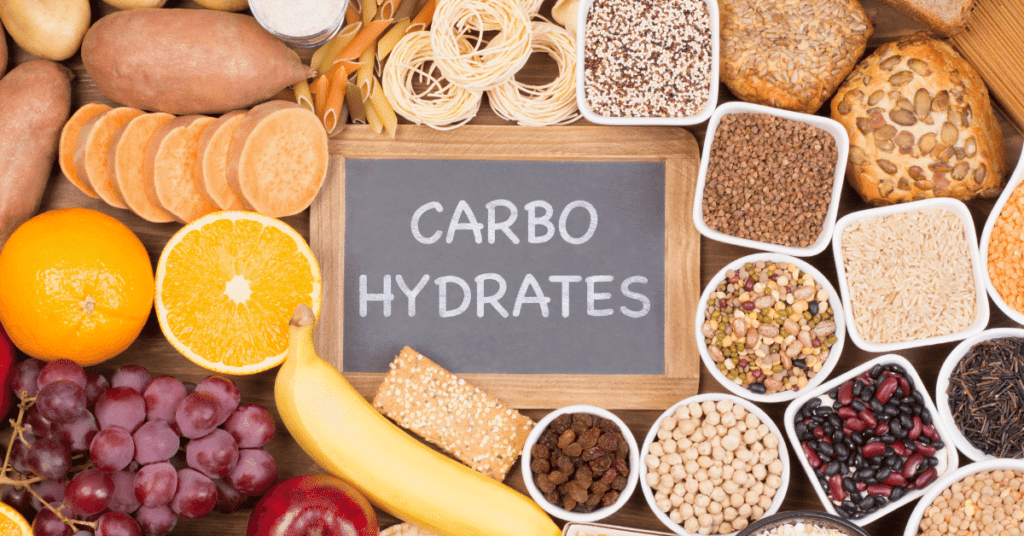Contents
- 1 Carbohydrates
- 2 How Many Carbs Should I Eat?
- 3 Where Do I Get My Carbs?
- 4 Role Of Carbohydrates In Our Body
- 5 Best Time To Eat Carbohydrates
- 6 What Foods Contain Carbohydrates?
- 7 Effects Of Carbohydrates On The Brain And Mood States
- 8 Health Benefits Of Carbohydrates
- 9 Carbohydrates As Fuel For Energy
- 10 Conclusion
Carbohydrates

Carbohydrates are one of three macronutrients, found in plants and animal products. They provide energy for the body to function properly, which is why it’s important to include them in your diet. You can find carbs in bread, pasta, rice, oats, beans, potatoes-basically anything that contains starch or sugars.
Carbohydrates are one of the three macronutrients that make up a healthy diet. They provide energy for your body and help regulate moods, blood sugar levels, and even weight loss. However, carbohydrates may also lead to obesity in some people when eaten at high rates in excess of what is needed by the body. This article will explore how carbohydrates work in different ways depending on who they are consumed by and how much they are being eaten.
Carbohydrates are organic compounds that contain carbon, hydrogen, and oxygen. They come in the form of sugar or starches and they can be divided into 2 categories: sugars and starches. Starches include grains, bread, beans, potatoes, pasta, popcorn, etc. Sugars include fruits (specifically fruit juice), milk products (yogurt), vegetables (beans), dried fruit, etc. There are other types of carbohydrates but these are the main ones.
Note- Fiber is not technically considered to be a carbohydrate because it does not provide energy like carbohydrates do. However, fiber has many health benefits.
How Many Carbs Should I Eat?
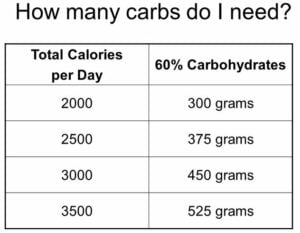 Carbs are necessary for athletes to train at their best, however, in today’s health-conscious world there is a belief that carbs are bad and should be avoided by all means. This is not true! Carbs provide many benefits when eaten in the right amount. It has been shown that both endurance athletes (runners, cyclists,s, etc.) and strength-training athletes (bodybuilders) lose fat easier when they consume one gram of carbohydrates per pound of body weight compared to those who stick to 0.5 grams per pound of body weight. However, it is also important to note that eating excess amounts of carbohydrates above what you need can lead to obesity due to imbalanced energy levels in your metabolism.
Carbs are necessary for athletes to train at their best, however, in today’s health-conscious world there is a belief that carbs are bad and should be avoided by all means. This is not true! Carbs provide many benefits when eaten in the right amount. It has been shown that both endurance athletes (runners, cyclists,s, etc.) and strength-training athletes (bodybuilders) lose fat easier when they consume one gram of carbohydrates per pound of body weight compared to those who stick to 0.5 grams per pound of body weight. However, it is also important to note that eating excess amounts of carbohydrates above what you need can lead to obesity due to imbalanced energy levels in your metabolism.
Where Do I Get My Carbs?
Carbs are present in both refined and unrefined sources. Unrefined sources are the best way to maintain a healthy diet because they contain more nutrients. Avoiding refined carbohydrates reduces your intake of sugars, sodium, calories, fat, etc. It has been shown that whole grains greatly improve blood sugar levels, especially when consumed at meals, and can reduce obesity risk by up to 40%. On the other hand, avoiding all sources of carbohydrates is not recommended and may lead to malnutrition due to low intakes of fiber, vitamins, and minerals.
The bottom line: Carbs provide many benefits but eating them in excess may lead to obesity so it is important for athletes who want to optimize their weight loss efforts while maintaining performance levels to find the right balance of eating enough carbs but not too many.
Carbs provide many benefits but eating them in excess may lead to obesity so it is important for athletes who want to optimize their weight loss efforts while maintaining performance levels to find the right balance of eating enough carbs but not too many.
Role Of Carbohydrates In Our Body
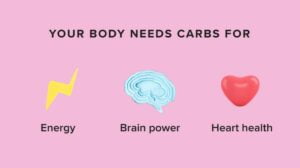
Carbohydrates are considered to be the essential macronutrient, meaning they are necessary in order to survive. Carbohydrates are made of sugar (glucose) molecules and can be found in different forms throughout our body, with the most basic form found in the form of glycogen. Glycogen is rapidly consumed by our brain and is extremely efficient at providing glucose for energy from carbohydrates.
Glycogen is also present in the liver and muscles. These glycogens are where carbohydrates are stored for energy throughout our body. Carbohydrates can help us maintain healthy blood sugar levels which allows us to be more focused on specific tasks at hand than feeling fatigued or unfocused due to low blood sugar.
Carbohydrates need water in order to expand, therefore if we do not get enough water in our diet it will affect how carbohydrates act within our body. Carbohydrate-containing foods include fruits, grains, vegetables, dairy products (whey protein) legumes (beans), nuts, seeds, etc. The different types of carbohydrates that exist are glucose (blood sugar), fructose (fruit sugar), galactose (milk sugar), sucrose (table sugar), maltose, lactose.
Role Of Carbs For Athletes
Carbs are the primary source of energy for your body. They fuel your muscles during strenuous activity, help you maintain blood sugar levels, and even give you an energy boost. It has been shown that athletes who train regularly perform at their peak when they eat a higher carbohydrate diet (4 grams per pound of body weight) compared to those who stick to a lower carbohydrate diet (1 gram per pound of body weight). This is because carbohydrates help athletes by providing them with more energy throughout training sessions allowing them to push harder than they would if carbs were not in their system. Athletes also benefit from having stable blood sugar levels which leads to fewer mood swings and fewer cravings for sugary foods after workouts.
Best Time To Eat Carbohydrates

There are different theories within literature when it comes to when carbohydrate consumption needs to take place in order for it to be beneficial. Some believe that the consumption of carbohydrates before training probably has no effect on performance. While others say pre-workout consumption can decrease reaction time and reduce insulin sensitivity in skeletal muscle meaning the body will not use the energy source as efficiently. This means a higher risk of fatigue during exercise due to impaired insulin function preventing proper management of blood glucose levels. Consumption during exercise will provide an immediate energy source very quickly. But only until glycogen stores are depleted could drop blood sugar levels cause fatigue or lack of motivation. Post-workout consumption is important because insulin is the most potent anabolic hormone, meaning it induces muscle protein synthesis, this can be achieved if carbohydrate consumption takes place within 30minutes after exercise.
What Foods Contain Carbohydrates?
Foods high in carbohydrates are whole grains (oats, quinoa), fruits (blueberries, apples), legumes (chickpeas), vegetables (potatoes), and dairy products. Those who use a ketogenic diet severely limit carbohydrate intake to around 50-60g per day which puts their body into a metabolic state known as ketosis where instead of using carbohydrates for energy the body would burn fat for energy. Foods that are low in carbohydrates include beef jerky, cheese, cured meats without added sugar/carbohydrate fillers, fatty fish (salmon), egg yolk, and even some vegetables such as cabbage and cauliflower.
Effects Of Carbohydrates On The Brain And Mood States
Carbohydrates can be represented by glucose and fructose that our body uses for energy but they also play a role in the central nervous system. A number of studies have been conducted to determine if there is any link between carbohydrate intake and mental well-being. This is because glucose has been linked with increased memory performance. Glucose is necessary for neurotransmitter production including serotonin which affects mood, fatigue levels, and how we sleep. The brain requires approximately 130g/day of glucose that comes from dietary processes and those that are stored as glycogen in the liver and muscles.
When deciding on how many carbohydrates you should consume, it is important to find out what your goals are. If you are seeking to lose weight, then a lower carbohydrate intake would be beneficial. This means limiting your consumption of foods high in carbohydrates such as fruit, whole grains, legumes, and vegetables. Low-carb diets are very common and the ketogenic diet severely limits carbohydrate intake to around 50-60g per day which puts the body in a metabolic state known as ketosis where instead of using carbohydrates for energy the body would burn fat for energy. Carbohydrates can also play a role in mood states and there is evidence to suggest that chronic consumption of high GI diets can lead to insulin resistance and obesity which increases the risk for cardiovascular disease.
Health Benefits Of Carbohydrates
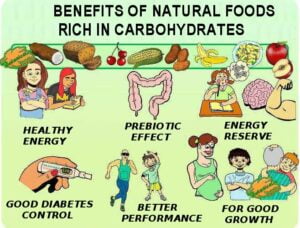 For athletes, carbohydrate intake is important to help with energy levels and performance. However, it has been seen that excessive carbohydrate consumption can lead to weight gain and the risk of developing cardiovascular disease later in life. Therefore, endurance athletes should focus on high-quality carbohydrates such as fruits and vegetables rather than just focusing on quantity. Carbohydrate intake for endurance training requires a mixture of muscle glycogen replenishment and liver glycogen storage for optimal performance. But this depends on the duration of exercise time.
For athletes, carbohydrate intake is important to help with energy levels and performance. However, it has been seen that excessive carbohydrate consumption can lead to weight gain and the risk of developing cardiovascular disease later in life. Therefore, endurance athletes should focus on high-quality carbohydrates such as fruits and vegetables rather than just focusing on quantity. Carbohydrate intake for endurance training requires a mixture of muscle glycogen replenishment and liver glycogen storage for optimal performance. But this depends on the duration of exercise time.
It is also suggested that consuming carbs before long bouts of continuous cardio may not be beneficial. Because although they will provide you with energy initially they are likely to cause fatigue later on which may affect performance. However, it is advisable to consume carbs after exercise as this will promote glycogen synthesis and reduce muscle damage. And this may lead to delayed onset of fatigue.
In terms of health benefits from carbohydrate intake, whole grain foods have been linked with improved heart health. Because of an increased level of fiber and other beneficial nutrients including magnesium, potassium, and antioxidants. That can help lower blood pressure levels. The dietary fiber in potatoes means they are an excellent choice for those seeking weight loss. Because the high water content helps you feel full without eating too many kilojoules. Potatoes also have a low GI score. So they can provide sustained energy throughout the day helping you stay alert at work or school.
Glycemic Index (GI)
A measure of how fast carbohydrates are absorbed into the blood after being eaten. A low GI value means that it takes longer for the carbohydrate to be released into the bloodstream.
Foods with high GI produce more episodes of reactive hypoglycemia than those with lower rates such as legumes, barley, and beans. There is also evidence to suggest that chronic consumption of high GI diets can lead to insulin resistance and obesity. It increases the risk of cardiovascular disease. It has been said that low GI foods should be incorporated into a weight loss diet. Because they will make people feel full for longer periods of time meaning we will not have cravings between meals.
Studies have shown low dietary carbohydrates may result in poor cognitive function, mood swings, and fatigue. The glycaemic index of carbohydrate-containing foods is a predictor of the effects on memory performance. As lower GI ratings were linked to higher memory scores which are likely due to increased insulin sensitivity and glucose transport into the brain. Low GI diets can improve overall health and wellbeing by providing sustained energy levels across the day. It means we will be less fatigued and more focused on tasks at hand than worrying about our next meal. However, it has been suggested that there needs to be more emphasis placed on glycemic load. Rather than glycemic index because it takes carbohydrate content and quantity, fiber, and other nutrients present in the food. It makes GI a less effective indicator for overall health benefits.
Glycemic Load (GL)
This is a more accurate measurement for GI. Because GL calculates the glycemic impact of foods with 10 or more grams of carbohydrates. This accounts for differences between serving sizes and allows the food’s GI score to be adjusted accordingly. So you can see exactly how much glucose will enter your bloodstream after eating it.
Carbohydrates As Fuel For Energy
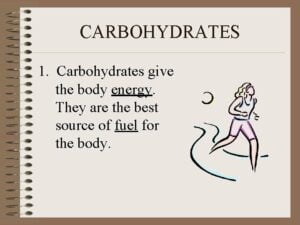 One of three macronutrients, they are essential for providing energy to the body, especially the brain. Carbohydrates are further broken down into glucose which acts as the primary source of fuel for the body.
One of three macronutrients, they are essential for providing energy to the body, especially the brain. Carbohydrates are further broken down into glucose which acts as the primary source of fuel for the body.
Carbohydrates are a type of macronutrient. Macronutrients provide the body with calories and energy in the form of carbohydrates, fat, protein, or alcohol. Carbohydrates are present in foods such as grains, vegetables, and sugars. Your brain needs carbohydrates to function properly. Because it is one of your main sources of fuel when you’re not eating food that contains sugar like candy bars or cookies. There are three types of carbohydrates: starches, sugars, and fiber-rich carbs. Starches include refined grain products. Such as bread from white flour which has been stripped of its natural nutrients along with potatoes. A starch-loaded vegetable often eaten boiled during dinner time at home by many people around the world. Including Americans who consider them a staple vegetable dish.
Sugar is a natural carbohydrate present in foods such as fruit, sugar cane, and milk. There are many different types of sugar. But the most common sugars consumed by humans include fructose, glucose, maltose, and sucrose.
Fiber-rich carbs are present in foods like vegetables that have not been altered in their original state. In order to preserve all of the nutrients they contain. Fiber is an important part of your diet because it helps keep your digestion system healthy by regulating bowel movements. So you don’t get constipation or experience stomach cramps often associated with eating junk food containing no fiber at all. Fiber goes through your gut without digestion taking place. So it doesn’t raise blood sugar levels instead increases metabolism by removing cholesterol.
Conclusion
Carbohydrates are a major and important food component of food. However, just like every other food component, within limits. Carb counting becomes necessary if you have some health conditions like diabetes or hypertension. If you looking for dieticians who can help you plan your diet with the appropriate amount of food components. Our team has the best dieticians who are more than willing to help you.
Do you want to get rid of diabetes? Join our online diabetes consultation program and reverse Diabetes naturally through lifestyle changes such as a Personalized Diet plan, Exercise, Yoga, dieticians, and health coaches.
